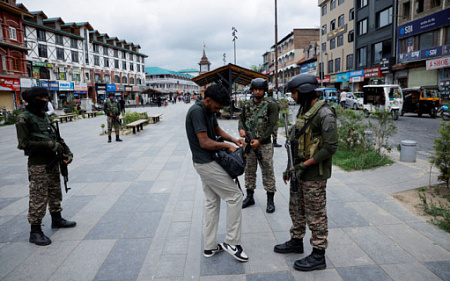
India and Pakistan continue to exchange blows, using rockets, artillery, and small arms. Delhi claims that it is hitting those enemy targets that are used to train and send militants carrying out terrorist attacks in Kashmir and other parts of India. Islamabad denies the accusations and incites chauvinistic hysteria among its citizens. The danger of conflict widening remains. But Pakistan has made it clear that if the very existence of the state is threatened, it will use nuclear weapons. And this does not give India the opportunity to use its superiority in the number of ground forces to defeat Pakistan.
On Friday night, the two countries continued to fire artillery and small arms fire at each other. The reason for the direct military confrontation was India’s missile strike on infrastructure in Pakistan, where saboteurs are being trained to raid India, killing military personnel, officials and ordinary citizens. This explains Delhi’s biggest attack on targets in Pakistan in recent decades. This attack was a response to the killing of 26 tourists in the Indian part of Kashmir by militants who penetrated through the line of control replacing the border from the Pakistani side more than two weeks ago.
Islamabad claims that it was not involved in the crime. Although it is hard to believe that Islamist groups can operate in “Free Kashmir,” as the part of Kashmir they control is called in Islamabad, without the patronage of the Pakistani inter-services intelligence.
The dangerous situation in South Asia could not fail to attract attention from the world powers. This is a reason for “concern, Russia calls on the parties to exercise restraint and negotiate to resolve differences,” said Dmitry Peskov, a spokesman for the Russian president. The reaction to the events from Washington was voiced by Secretary of State Marco Rubio. He called the leaders of India and Pakistan and advised them to agree on a de-escalation of the crisis. A similar statement was made by the Chinese Foreign Ministry.
According to The New York Times, the parties tend to look for some way to reach an agreement. Despite the bellicose statements of the leaders of the two states, it became known that officials of India and Pakistan began to contact each other. US President Donald Trump strongly advised Delhi and Islamabad to settle the dispute peacefully.
It is clear that the leaders of India and Pakistan cannot ignore both the mood of their electorate inside the country and the position of external players. In Pakistan, demonstrations were held in several cities under the slogan “take revenge on India for the deaths of civilians.” But the reporters who talked to the Pakistanis found out that in fact they do not want war. Pakistan has not recovered from the economic crisis, and it is itself being attacked by separatists.
At the same time, the weight of external players should also be taken into account. It would seem that Russia, which is conducting a special military operation in Ukraine, cannot play a big role in South Asian affairs at the moment. But, in reality, this is not the case. It is no coincidence that India used Russian S-400 anti-aircraft missile systems to repel Pakistani missiles. According to the India Today newspaper, it has deployed four S-400 divisions to this end.
According to Western agencies, Russia accounts for 33% of all arms shipments to India by foreign countries.
And for Pakistan, China has become the main supplier of weapons. Therefore, he can contribute to the normalization of the situation in South Asia.
